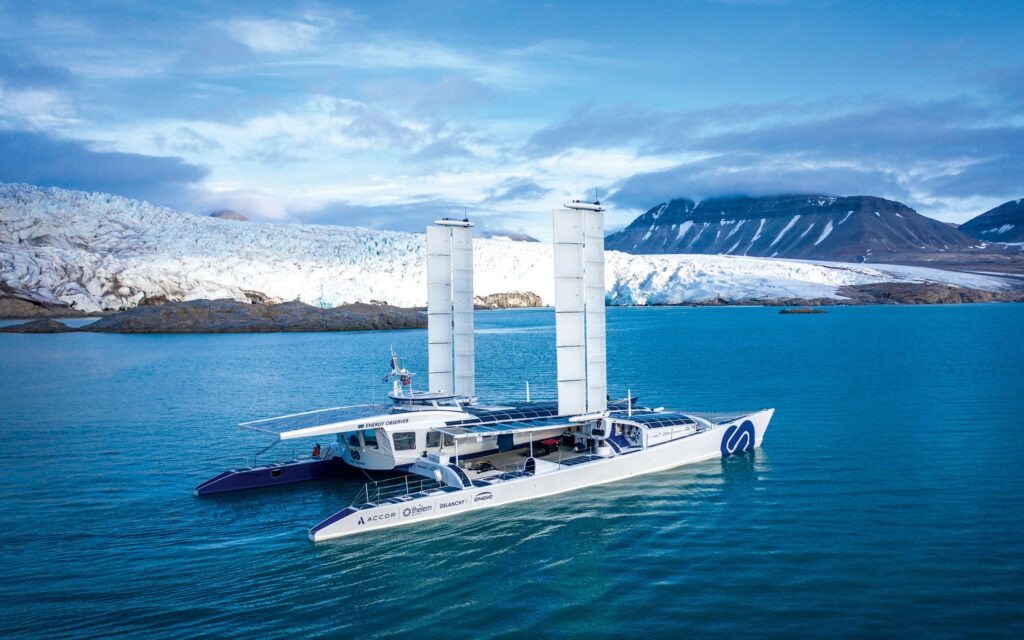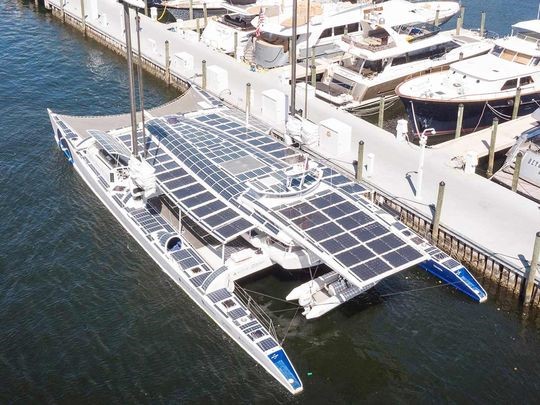Zero-emission ship
A group of mariners and alternative energy folks got together from 2013 through 2017 and built a 100 foot long catamaran boat the has sailed around the world and not used any “fossil fuel.” The 100-foot catamaran has logged 63,040 nautical miles without using oil. The sea shipping industry has been looking for years for some way reduce their pollution contribution. Most freighters run on “Bunker oil” which is about as crude as crude gets coming out of the ground. Besides making a lot of soot with an incomplete burn because of the fuel and the power plant, these ships also have much higher outputs of CO2 and NO than most cities will allow. The “Energy Observer,” the first hydrogen-powered, zero-emission vessel to be energy self-sufficient. This mission has tested renewable energy – including by using solar panels and advanced sails called “oceanwings” – as a power source in multiple climates off the coasts of Africa, Asia and Antarctica.
“We learned a lot along this journey,” captain Marin Jarry told AFP in Fort Lauderdale, just north of Miami. The project hopes to influence the shipping and maritime sectors, especially as its “oceanwings” have already been used in commercial shipping. They were used on a freighter called the Canopee, which was designed to transport parts of Europe’s Ariane 6 rocket. In the course of the Energy Observer’s current voyage, 40 percent of the vessel’s energy has come from wind, 40 percent from solar and 20 percent from hydrogen. A ship powered by renewable energy, including hydrogen produced onboard. An Energy Observer 2 is already in the works: a cargo ship measuring nearly 400 feet (120 meters) long, with a capacity to carry 5,000 metric tons. It is set to run on liquid hydrogen.
Today’s maritime transport is a sector of crucial importance for the global economy of our modern society. 80% of goods, in terms of volume, are transported on our seas: clothes, objects of all kinds, automobiles, spare parts, but also and above all, materials, food and fuel. Today there are nearly 100,000 commercial vessels of all sizes on our seas, ranging from 140 feet long passenger ferries to gigantic tankers over 1500 foot long. For the most part large ships carry bulk cargo and containers. The presence of these ships has a considerable impact on the ocean and the planet as a whole. Ships using fossil fuels create about 2.9% of global anthropogenic CO2 emissions. If maritime transport were a country, it would be the sixth most polluting in the world, just after Japan and ahead of Germany.
Energetic Laughter
My London energy supplier proudly boasts that they use 100% renewables. They sent my renewal quote.
Can anybody tell me what day it was when wind doubled in price?
The Energy Crisis has gotten so bad,
People now want a lump of coal in their stocking.
We need to start investing more in solar energy.
But it’s not just going to happen overnight.
I hear the “JOHN KERRY” has a bold plan to solve the world’s energy woes.
Gaslighting.
March 5th Birthdays
1975 – Niki Taylor, 1994 – Aislinn Paul, 1974 – Eva Mendes, 1986 – Dominique McElligott
1955 – Penn Jillette 1958 – Andy Gibb 1893 – Emmett Culligan, 1936 – Dean Stockwell




